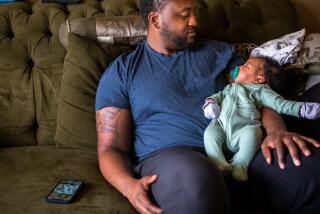SOUTHERN CALIFORNIA JOB MARKET: WORK AND FAMILY : WORKING PARENTS’ TRIALS : Paternity Leaves Are More Common, but Fewer Men Are Taking Them
- Share via
The expectant father walked into his boss’s office planning to take advantage of a new paternity leave policy.
The reaction he got was deflating. “I know you’re entitled to parental leave, but take vacation days instead,” said the manager, advising him not as a boss but as a friend. “If you take a leave, you’ll be branded around here forever as uncommitted.”
The story, which a congressional panel heard last summer from fathers’ advocate James A. Levine, is unusual only in that the message was actually spoken.
More and more companies are offering parental leave to men, but very few fathers are taking advantage of it.
“When a guy takes parental leave, there’s a very high possibility he’s going to end up on the cover of a magazine,” said Fran Sussner Rogers of Work/Family Directions, a Boston consulting firm.
“Men report more difficulties with balancing work and family life than they used to . . . but their behavior has not changed,” she said. “Men are more upset, but they are not doing anything about it.”
The reason for this is largely financial. In dual-income families, most husbands earn more than their wives, and few families can afford to have both breadwinners stay home with a new baby. The recession doesn’t help, as many men are wary of being gone so long that the boss concludes they are dispensable. Tradition and stereotypes are also factors--the lingering suspicion that Mr. Mom may be a wimp.
Such attitudes may be most deeply rooted in older males at the top of the corporate ladder. Happily or not, these senior managers usually put their own family matters on a back burner to invest the long hours it took to get ahead. Now they make the key decisions on hiring and promotion.
“There’s still a corporate culture that says that the men who rise into the executive suite are trained killers,” said a male executive at one Fortune 500 manufacturer that has comprehensive, pro-family policies. “It’s accepted that one of the sacrifices they make is their families. . . . I think it stinks.”
“It would be permissible here to take your four-week vacation and spend it at home,” he added, “but if a guy came in and said, ‘I’m taking three months off without pay to be with my wife and my new son,’ I think he would be looked at as a sissy.”
The Bureau of Labor Statistics reports that 18% of those who worked for companies with 100 or more employees were entitled to unpaid paternity leave in 1989. At firms with fewer than 100 employees, only 7% offered unpaid paternity leave in 1990. State and local govern ernment employees fared better; 33% of such employers offered unpaid leave to men.
No statistics exist on how many men are taking advantage of paternity leave. The picture is obscured because fathers are far more likely to spend “vacation” days with a newborn or newly adopted child.
Campbell’s Soup Co. has offered unpaid paternity leave for four years, but a spokesman said he was unaware of any takers. At AT&T;, one male employee in 400 took paternity leave in 1979; that figure rose to one in 30 men by 1989. Aetna Life & Casualty began offering up to six months’ unpaid leave to men or women in 1988, but only about 5% of those requesting leave were men.
Perhaps more typical is the policy at Vickers Inc., an Omaha manufacturer of hydraulic pumps. Any of the company’s 1,200 employees may ask for unpaid personal leave, which is granted depending on the circumstances and production schedule. No man has ever asked for a paternity leave, said Brenda Moore, human resources representative.
The idea that taking time for bonding with a newborn is a perquisite and not a necessity--especially for men--remains widespread, complained a female executive at another Fortune 500 firm.
“(Managers) tend to view it as a vacation, though anyone who has a child knows it’s far from that,” she said.
Despite rising pro-family rhetoric and policies at many large companies, employers who are willing to pay for paternity leave are as rare as newborns who sleep through the night. Only 1% of firms offered paid leaves to fathers in 1989, according to the Bureau of Labor Statistics.
One of the few Southern California employers to do so is RAND Corp., the Santa Monica-based think tank. It offers 10 paid days of paternity leave.
“Everyone went, ‘God, you lucky dog!’ ” said Chris Bowie, a military historian at RAND and senior staffer who took paternity leave after his son was born on Christmas Eve. “The fact that the company offers you 10 days is a sign that it’s not a bad thing to do. I think it’s very important.”
Some argue that paternity leave, though symbolic of changing social values, is far less important than policies that allow men to spend time with their children later on.
“It is in the day-to-day messiness of managing family and career that the difficult choices are made, not so much in the first two months,” said Rogers.
Every recent survey has shown that men are increasingly torn and unhappy over what seems a stark choice between the “daddy track” and career advancement.
A Du Pont survey of 8,500 employees in April found that 57% of men wanted schedule flexibility, up from 37% five years earlier. Moreover, 64% said they wanted a sick-child-leave option; 35% wanted a transition period of part-time work so they could help care for a newborn; 40% said they had considered looking for a job that offered more flexibility.
Men “are as much affected by these work and family issues as women,” said Faith Wohl, Du Pont’s director of work force partnering.
While only about four dozen men have taken leaves since 1986, many more have taken advantage of flexible schedules, cutting back their hours or working a four-day week to help with child-rearing.
Rick Maslin, director of corporate communications at Fluor Corp. in Irvine, said he planned to take two weeks off after his son was born six years ago but went back to work the second week.
“I was really kind of superfluous,” he said. “My wife came home real quick, was up and around real quick. . . . The kid was either eating or sleeping, and I wasn’t much help doing either.” Maslin says he’d rather have more time off from work now that his son is older and better able to appreciate extra time with a parent.
More to Read
Inside the business of entertainment
The Wide Shot brings you news, analysis and insights on everything from streaming wars to production — and what it all means for the future.
You may occasionally receive promotional content from the Los Angeles Times.










